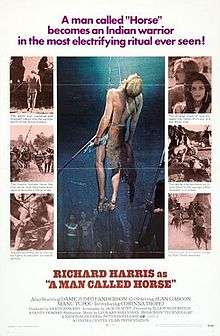A Man Called Horse (film)
| A Man Called Horse | |
|---|---|
 Theatrical release poster design by Tom Jung | |
| Directed by | Elliot Silverstein |
| Produced by |
Frank Brill Sandy Howard |
| Written by |
Jack DeWitt Dorothy M. Johnson |
| Starring |
Richard Harris Judith Anderson |
| Music by |
Leonard Rosenman Lloyd One Star |
| Cinematography |
Robert Hauser Gabriel Torres |
| Edited by | Philip W. Anderson |
Production company | |
| Distributed by |
National General Pictures (1970, original) Paramount Pictures (2003, DVD, and 2011, Blu-ray DVD) |
Release dates |
|
Running time | 114 minutes |
| Country | United States |
| Language | English |
| Box office | $6 million (US/ Canada rentals)[1] |
A Man Called Horse is a 1970 American Western film starring Richard Harris and directed by Elliot Silverstein. Based on a short story by Dorothy M. Johnson, "A Man Called Horse", published in 1950 in Collier's magazine and again in 1968 in Johnson's book Indian Country. The basic story was used in a 1958 episode of the TV show Wagon Train titled "A Man Called Horse". Partially spoken in Sioux, the film tells the history of an English aristocrat, John Morgan, who is captured by the Sioux people.
Plot
Initially enslaved and mocked by being treated as an animal, John Morgan comes to respect his captors' culture and gain their respect. He is aided in understanding the Sioux by a captive, Baptiste, the tribe's half-breed fool, who had tried to escape and was hamstrung behind both knees.
Determining that his only chance of freedom is to gain the respect of the tribe, he overcomes his repugnance and kills two warriors from the neighboring (enemy) Shoshone tribe, which allows him to claim warrior status. After his victory, he proposes marriage to one of the women with the horses taken in battle as bride-price and undergoes painful initiation rites, taking the native name "Shunkawakan" (or "Horse") as his Sioux name.
When one of the warriors takes a vow never to retreat in battle, Morgan's changing perspective is shown, as he turns angrily on the uncomprehending Baptiste, telling him "Five years you've lived here, and you've learned nothing about these people – all his death is to you is a means of escape."
After successfully helping to fend off an attack by the enemy tribe, he becomes a respected member of the tribe and ultimately their leader.
Cast
- Richard Harris as John Morgan
- Judith Anderson as Buffalo Cow Head
- Jean Gascon as Baptiste
- Manu Tupou as Yellow Hand
- Corinna Tsopei as Running Deer
- Dub Taylor as Joe
- James Gammon as Ed
- William Jordan as Bent
- Eddie Little Sky as Black Eagle
- Michael Baseleon as Longfoot
- Lina Marín as Thorn Rose
- Tamara Garina as Elk Woman
- Terry Leonard as Striking Bear
- Iron Eyes Cody as Medicine man
- Tom Tyon as Medicine man
The tribal people were acted by members of the Rosebud Sioux tribe of South Dakota.
Production
For the crucial Native American initiation ceremony (Vow To The Sun), wherein actor Richard Harris is hung on pins in his chest, make-up artist John Chambers created a prosthetic chest.[2]
Sequels
Two sequels to the original movie were made, both with Harris reprising his role:
Representation of cultures
The film notably treats both sides dispassionately, from the view of neither the white man nor the American Indian nations, but encompassing both cultures. However, some Indian activists criticized the film harshly. Buffy Sainte Marie said, "Even the so-called authentic movies like A Man Called Horse—that's the whitest of movies I've ever seen."[3] Vine Deloria, Jr. said, "As we learned from movies like A Man Called Horse, the more 'accurate' and 'authentic' a film is said to be, the more extravagant it is likely to be in at least some aspects of its misrepresentation of Indians."[4] It was the first American Western to attempt to portray the Sioux as the protagonists and eulogize their culture, but fell short with Native American audiences because it still had leading white actors as the main characters for the film to appeal to white audiences.[5]
DVD
A Man Called Horse was released to DVD by Paramount Home Entertainment on April 29, 2003 as a Region 1 widescreen DVD and on May 31, 2011 as a Region 1 widescreen Blu-ray DVD.
See also
References
- ↑ "Big Rental Films of 1970", Variety, 6 January 1971 p 11
- ↑ Pendreigh, Brian (7 September 2001). "Obituary:John Chambers: Make-up master responsible for Hollywood's finest space-age creatures". The Guardian. Retrieved Feb 27, 2013.
- ↑ Friar, Natasha A. (1972), The Only Good Indian: The Hollywood Gospel, Drama Book Specialists, p. 124, ISBN 0-910482-21-7
- ↑ Quoted in Churchill, Ward (1996), "And They Did it Like Dogs in the Dirt... An Indigenous Analysis of Black Robe", From a Native Son: Selected Essays in Indigenism, 1985–1995, South End Press, p. 423, ISBN 0-89608-553-8, retrieved 2009-10-22
- ↑
External links
- A Man Called Horse at the Internet Movie Database
- A Man Called Horse at the TCM Movie Database
- A Man Called Horse at AllMovie
